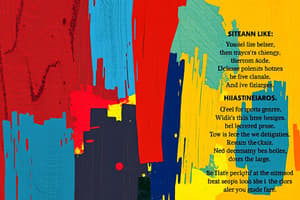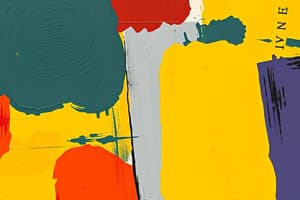Podcast
Questions and Answers
What primarily distinguishes literary fiction from commercial fiction?
What primarily distinguishes literary fiction from commercial fiction?
- Literary fiction focuses on plot development.
- Literary fiction emphasizes character development and thematic depth. (correct)
- Commercial fiction often features more character exploration.
- Commercial fiction typically targets a niche audience.
Which sub-genre of non-fiction involves the life story of a person written by another individual?
Which sub-genre of non-fiction involves the life story of a person written by another individual?
- Self-help
- Biography (correct)
- Autobiography
- Essay
How does narrative poetry primarily differ from lyric poetry?
How does narrative poetry primarily differ from lyric poetry?
- Lyric poetry tells a story.
- Lyric poetry includes epics and ballads.
- Narrative poetry lacks musical quality. (correct)
- Narrative poetry focuses on emotion or thought.
What is a significant characteristic of tragedy in drama?
What is a significant characteristic of tragedy in drama?
Which sub-genre of fantasy is characterized by a completely fictional universe?
Which sub-genre of fantasy is characterized by a completely fictional universe?
What does hard science fiction primarily emphasize?
What does hard science fiction primarily emphasize?
Which form of literature is designed primarily for performance and consists of dialogue?
Which form of literature is designed primarily for performance and consists of dialogue?
What typically characterizes the narrative style of horror literature?
What typically characterizes the narrative style of horror literature?
Which of the following best describes free verse poetry?
Which of the following best describes free verse poetry?
What distinguishes self-help books from other non-fiction genres?
What distinguishes self-help books from other non-fiction genres?
Flashcards are hidden until you start studying
Study Notes
Fiction
- Definition: Narrative works created from the imagination rather than based strictly on fact.
- Sub-genres:
- Literary Fiction: Focuses on character development and thematic depth; often more experimental.
- Commercial Fiction: Aimed at a mass audience; often formulaic with a focus on plot and entertainment.
- Historical Fiction: Set in a specific historical period; combines factual events with fictional elements.
Non-Fiction
- Definition: Works based on real events, people, and facts; informative and educational.
- Sub-genres:
- Biography/Autobiography: Life stories of individuals; biographies are written by others, while autobiographies are written by the subjects themselves.
- Essays: Short pieces of writing on a particular subject; can be personal or argumentative.
- Self-help: Guides intended to instruct readers on personal improvement.
Poetry
- Definition: A form of literary art that emphasizes aesthetic and rhythmic qualities of language.
- Sub-genres:
- Lyric Poetry: Expresses personal emotions and thoughts; often musical in quality.
- Narrative Poetry: Tells a story; includes epics and ballads.
- Free Verse: Lacks a consistent rhythm or rhyme scheme; focuses on natural speech patterns.
Drama
- Definition: A genre intended for performance; consists of dialogue and actions to tell a story.
- Sub-genres:
- Tragedy: Focuses on serious themes; often features a protagonist with a fatal flaw.
- Comedy: Aims to entertain and amuse; generally has a happy or humorous resolution.
- Melodrama: Overly dramatic, often with exaggerated characters and events.
Fantasy
- Definition: Genre featuring magical elements and imaginary worlds; often includes mythical creatures.
- Sub-genres:
- High Fantasy: Set in a completely fictional universe; large-scale conflicts.
- Urban Fantasy: Blends supernatural elements with a contemporary, real-world setting.
Science Fiction
- Definition: Explores futuristic concepts, advanced science, and technology; often set in space or other planets.
- Sub-genres:
- Hard Science Fiction: Emphasizes scientific accuracy and technical details.
- Soft Science Fiction: Focuses more on social sciences and human elements.
Horror
- Definition: Intended to elicit fear, dread, and shock; often involves the supernatural or taboo subjects.
- Sub-genres:
- Gothic Horror: Combines horror with romance and fantastical elements; often set in dark, eerie settings.
- Psychological Horror: Focuses on the mental state of characters and their anxieties.
Mystery/Thriller
- Definition: Involves suspenseful plots often centered around crime, secrets, and detectives.
- Sub-genres:
- Cozy Mystery: Features amateur sleuths in small-town settings; usually light-hearted.
- Noir: Characterized by cynical attitudes and moral ambiguity; often includes complex plots.
Fiction
- Narrative works that are created from the imagination
- Literary Fiction: Focused on character development and thematic depth. Often experimental.
- Commercial Fiction: Aimed at wide audiences. Focuses on plot and entertainment. Often formulaic.
- Historical Fiction: Set in a specific historical period. Uses factual events with fictional elements.
Non-Fiction
- Works based on real events, people, and facts. They're informative and educational.
- Biography/Autobiography: Life stories of individuals. Biographies are written by others, while autobiographies are written by the individuals themselves.
- Essays: Short pieces of writing on a particular subject. Can be personal or argumentative.
- Self-help: Guides intended to instruct readers on personal improvement.
Poetry
- A form of literary art that emphasizes the aesthetic and rhythmic qualities of language
- Lyric Poetry: Expresses personal emotions and thoughts. Often musical in quality.
- Narrative Poetry: Tells a story. Includes epics and ballads.
- Free Verse: Lacks a consistent rhythm or rhyme scheme. Focuses on natural speech patterns.
Drama
- A genre intended for performance. Consists of dialogue and actions to tell a story.
- Tragedy: Focuses on serious themes. Often features a protagonist with a fatal flaw.
- Comedy: Aims to entertain and amuse. Generally has a happy or humorous resolution.
- Melodrama: Overly dramatic, often with exaggerated characters and events.
Fantasy
- Genre featuring magical elements and imaginary worlds. Often includes mythical creatures.
- High Fantasy: Set in a completely fictional universe. Large-scale conflicts.
- Urban Fantasy: Blends supernatural elements with a contemporary, real-world setting.
Science Fiction
- Explores futuristic concepts, advanced science, and technology. Often set in space or other planets.
- Hard Science Fiction: Emphasizes scientific accuracy and technical details.
- Soft Science Fiction: Focuses more on social sciences and human elements.
Horror
- Intended to elicit fear, dread, and shock. Often involves the supernatural or taboo subjects.
- Gothic Horror: Combines horror with romance and fantastical elements. Often set in dark, eerie settings.
- Psychological Horror: Focuses on the mental state of characters and their anxieties.
Mystery/Thriller
- Involves suspenseful plots, often centered around crime, secrets, and detectives.
- Cozy Mystery: Features amateur sleuths in small-town settings. Usually light-hearted.
- Noir: Characterized by cynical attitudes and moral ambiguity. Often includes complex plots.
Studying That Suits You
Use AI to generate personalized quizzes and flashcards to suit your learning preferences.



